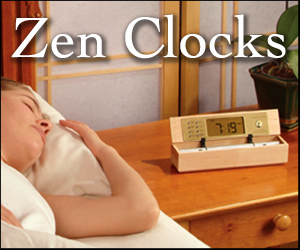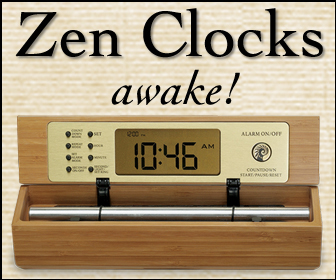
Wake up refreshed, love your alarm clock, transform your mornings with The Zen Alarm Clock's progressive awakening with gentle chimes.
Too busy to go to bed? Having trouble getting quality sleep once you do? Your health may be at risk
It’s National Sleep Awareness Week. Before hitting snooze on this news, consider that scheduling a good night’s sleep could be one of the smartest health priorities you set. It’s not just daytime drowsiness you risk when shortchanging yourself on your seven to nine hours. (More than 35 percent of adults routinely clock less than seven hours per night, according to the National Sleep Foundation.) Possible health consequences of getting too little or poor sleep can involve the cardiovascular, endocrine, immune, and nervous systems. In addition to letting life get in the way of good sleep, between 50 and 70 million Americans suffer from a chronic sleep disorder—such as insomnia or sleep apnea—that affects daily functioning and impinges on health. Here’s a look at the research:
1) Less may mean more. Among people who sleep under seven hours a night, the fewer zzzz’s they get, the more obese they tend to be, according to a 2006 Institute of Medicine report. This may relate to the discovery that insufficient sleep appears to tip hunger hormones out of whack. Leptin, which suppresses appetite, is lowered; ghrelin, which stimulates appetite, gets a boost.
2) You’re more apt to make bad food choices. A study published in 2008 in the Journal of Clinical Sleep Medicine found that people with obstructive sleep apnea or other severely disordered breathing while asleep ate a diet higher in cholesterol, protein, total fat, and total saturated fat. Women were especially affected.
3) Diabetes and impaired glucose tolerance, its precursor, may become more likely. A 2005 study published in theArchives of Internal Medicine found that people getting five or fewer hours of sleep each night were 2.5 times more likely to be diabetic, those getting six hours or fewer were 1.7 times more likely.

Waking up in the morning should be as pleasant as falling asleep at night. The Zen Alarm Clock's gradual, gentle awakening is transformative.
4) The ticker is put at risk. A 2003 study found that heart attacks were 45 percent more likely in women who slept five or fewer hours per night than in those who got more. And a 2008 study in the Journal of the American Medical Association found that too little sleep promotes calcium buildup in the heart arteries, leading to the plaques that can cause heart attacks and strokes.
5) Blood pressure may increase. Obstructive sleep apnea, for example, has been associated with chronically elevated daytime blood pressure, and the more severe the disorder, the more significant the hypertension, suggests the 2006 IOM report. Obesity plays a role in both disorders, so losing weight can ease associated health risks.
6) Auto accidents rise. As stated in a 2007 report in the New England Journal of Medicine, nearly 20 percent of serious car crash injuries involve a sleepy driver—and that’s independent of alcohol use. Sleepiness affects professional drivers, too. The National Sleep Foundation’s 2012 Sleep in America poll, released Saturday, found that 20 percent of airline pilots admit they’ve made a serious error due to lack of sleep, compared with 18 percent of train operators and 14 percent of truck drivers.
7) Balance is off. Older folks who have trouble getting to sleep, who wake up at night, or are drowsy during the day could be 2 to 4.5 times more likely to sustain a fall, found a 2007 study in the Journal of Gerontology.
8) You may be more prone to depression. Adults who chronically operate on fumes report more mental distress, depression, and alcohol use. Adolescents suffer, too: One survey of high school students found similarly high rates of these issues. Middle schoolers, too, report more symptoms of depression and lower self-esteem.
9) You won’t be as nice. In general, sleep loss is likely to negatively affect your mood, causing irritability, impatience, and an inability to concentrate. A 2011 study in the Academy of Management Journal found that a lack of sleep increased deviant and unethical behavior, making people more rude and more likely to respond inappropriately in situations.
10) Your smarts may suffer. Sleep promotes learning, according to the Harvard Women’s Health Watch. It helps the brain commit new information to memory, and researchers have found that people who sleep after learning a task do better on later tests. In 2011, University of London scientists said that getting less than six to eight hours of sleep a night can age your brain by four to seven years—increasing the speed of cognitive decline, and worsening vocabulary and reasoning abilities.

Wake up with gradual, beautiful acoustic chimes. The Zen Alarm Clock transforms your mornings and gets you started right, with a progressive awakening
11) Kids may suffer more behavior problems. Research from a 2008 issue of the Archives of Pediatric and Adolescent Medicine found that children who are plagued by insomnia, short duration of sleeping, or disordered breathing with obesity, for example, are more likely to have behavioral issues like attention deficit hyperactivity disorder.
12) You’ll look better. Beauty sleep is no myth: People are perceived as being less attractive and more unhealthy when they’re sleep-deprived than when they’re well-rested, according to research published in 2012 in the British Medical Journal. Swedish researchers photographed 23 volunteers on two occasions: Once, after getting eight hours of sleep, and again after being kept awake for 31 hours following five hours of sleep. None of the participants wore makeup and all were equally clean-shaven. More than 60 untrained observers rated the photos. Participants were judged to be 4 percent less attractive, 6 percent less healthy, and 19 percent more tired when they were sleep-deprived.
13) Death’s doorstep may be nearer. Those who get five hours or less per night have approximately 15 percent greater risk of dying—regardless of the cause—according to three large population-based studies published in the journals Sleep and the Archives of General Psychiatry.
Boulder, Colorado—an innovative company has taken one of life’s most unpleasant experiences (being startled awake by your alarm clock early Monday morning), and transformed it into something to actually look forward to. “The Zen Alarm Clock,” uses soothing acoustic chimes that awaken users gently and gradually, making waking up a real pleasure. Rather than an artificial recorded sound played through a speaker, the Zen Clock features an alloy chime bar similar to a wind chime. When the clock’s alarm is triggered, its chime produces a long-resonating, beautiful acoustic tone reminiscent of a temple gong. Then, as the ring tone gradually fades away, the clock remains silent until it automatically strikes again three minutes later. The frequency of the chime strikes gradually increase over ten-minutes, eventually striking every five seconds, so they are guaranteed to wake up even the heaviest sleeper. This gentle, ten-minute “progressive awakening” leaves users feeling less groggy, and even helps with dream recall.

Wake up refreshed, love your alarm clock, transform your mornings with The Zen Alarm Clock's progressive awakening with gentle chimes.
By SARAH BALDAUF, ANGELA HAUPT for US News
Now & Zen – The Soothing Chime Alarm Clock Store
1638 Pearl Street
Boulder, CO 80302
(800) 779-6383
orders@now-zen.com
Posted in sleep